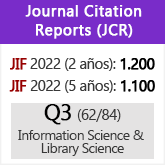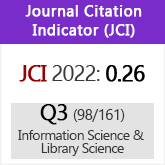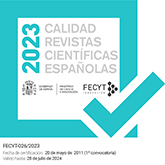Desarrollo profesional e intercambio de conocimiento en los grandes experimentos científicos
DOI:
https://doi.org/10.3989/redc.2014.4.1140Palabras clave:
Big science, colaboración científica, física de partículas, individuos, estudios de casoResumen
Los nuevos experimentos big science, que implican la colaboración de miles de investigadores procedentes de múltiples instituciones, están introduciendo cambios importantes en la organización de la actividad científica en muchas áreas de conocimiento. Todo ello tiene un impacto significativo en la vida profesional de los científicos, que necesitan adaptarse a nuevas dinámicas de trabajo y de relación entre colegas. Este artículo presenta un estudio de caso realizado en ATLAS, uno de los cuatro experimentos de física de partículas vinculados al Large Hadron Collider (LHC) en el CERN, en Ginebra. Mediante el análisis de micro-casos sobre experiencias individuales de miembros de la colaboración ATLAS, proponemos investigar cómo el aumento de tamaño y de complejidad de las colaboraciones científicas está afectando la carrera y la experiencia personal de los científicos y, consecuentemente, los procesos de producción y transmisión de conocimiento. Como resultado se presenta un conjunto de proposiciones teóricas potencialmente generalizables a otros experimentos de estas características.
Descargas
Citas
Aad, G.; Abajyan, T.; Abbott, B.; Abdallah, J.; Abdel Khalek, S.; Abdelalim, A. A.; Zwalinski, L. (2012). Observation of a new particle in the search for the Standard Model Higgs boson with the ATLAS detector at the LHC. Physics Letters B, vol. 716(1), 1-29. http://dx.doi.org/10.1016/j.physletb.2012.08.020
Baruch, Y. (2003). Transforming careers: from linear to multidirectional career paths. Organizational and individual perspectives. Career Development International,vol. 9 (1), 58-73. http://dx.doi.org/10.1108/13620430410518147
Baruch, Y.; Hall, D. T. (2004). The academic career: A model for future careers in other sectors? Journal of Vocational Behavior,vol. 64, 241-264. http://dx.doi.org/10.1016/j.jvb.2002.11.002
Benavent-Pérez, M.; Gorraiz, J.; Gumpenberger, G. y Moya-Anegón, F. (2012). The different flavors of research collaboration: a case study of their influence on university excellence in four world regions. Scientometrics,vol. 93, 41-58. http://dx.doi.org/10.1007/s11192-012-0638-4
Bressan, B.; Boisot, M. H. (2011). The individual in the ATLAS Collaboration: A learning perspective. En: M. H. Boisot, M. Nordberg, S. Yami & B. Nicquevert (Eds.), Collisions and collaboration: The organization of learning in the ATLAS experiment at the LHC (p. 201-225). Oxford, UK: Oxford University Press.
Canals, A. (2013). Knowledge in Big Science. En: J. Child & M. Ihrig (Eds.), Knowledge and the Study of Organization and Management: Building on the Work of Max Boisot (p. 155-168). Oxford, UK: Oxford University Press.
Canals, A.; Ortoll, E.; Nordberg, M. (2013). Redes de colaboración en big science: el experimento ATLAS en el CERN. Paper presented at the La colaboración científica: una aproximación multidisciplinar, Valencia.
Chompalov, I.; Genuth, J.; Shrum, W. (2002). The organization of scientific collaborations. Research Policy,vol. 31, 749-767. http://dx.doi.org/10.1016/S0048-7333(01)00145-7
De Fillippi, R. J.; Arthur, M. B. (1994). The boundaryless career: a competency-based perspective. Journal of Organizational Behavior, vol. 15 (4), 307-324. http://dx.doi.org/10.1002/job.4030150403
Dickmann, M.; Harris, H. (2005). Developing career capital for global careers: The role of international assignments. Journal of World Business, vol. 40, 399-408. http://dx.doi.org/10.1016/j.jwb.2005.08.007
Eby, L. T.; Butts, M.; Lockwood, A. (2003). Predictors of success in the era of the boundaryless career. Journal of Organizational Behavior, vol. 24, 689-708. http://dx.doi.org/10.1002/job.214
Eisenhardt, K. (1989). Building theories from case study research. Academy of Management Review,vol. 14(4), 532-550.
Etzkowitz, H.; Kemelgor, C. (1998). The role of research centres in the collectivisation of academic science. Minerva, vol. 36, 271-288. http://dx.doi.org/10.1023/A:1004348123030
Galison, P. (1987). How experiments end. Chicago; The University of Chicago Press.
Galison, P. (1992). Big Science: The Growth of Large Scale Research. Stanford, CA.; Stanford University Press.
Gazni, A.; Sugimoto, C. R.; Didegah, F. (2012). Mapping world scientific collaboration: authors, institutions, and countries. Journal of the American Society for Information Science and Technology, vol. 63 (2), 323-335. http://dx.doi.org/10.1002/asi.21688
Gibbs, G. (2007). Analysing qualitative data. Thousand Oaks, CA; Sage Publications.
Gillham, B. (2001). Case study research methods. New York; Continuum.
Green, D. (2010). At the leading edge: the ATLAS and CMS LHC Experiments. New Jersey; World Scientific.
Hall, D. T. (2002). Careers in and out organizations. Thousand Oaks, CA.; Sage.
Hicks, D. M.; Katz, J. S. (1996). Where is science going? Science, Technology, & Human Values,vol. 21(4), 379-406. http://dx.doi.org/10.1177/016224399602100401
Ihrig, M.; Canals, A.; Boisot, M. H.; Nordberg, M. (2012). Mapping critical knowledge assets in the ATLAS Collaboration at CERN: An I-Space approach. Paper presented at the OLKC 2012 - International Conference on Organizational Learning, Knowledge and Capabilities València.
Kamoche, K.; Pang, M.; Wong, A. L.;. (2011). Career development and knowledge appropriation: A genealogical critique. Organization Studies, vol. 32 (12), 1665-1679. http://dx.doi.org/10.1177/0170840611421249
King, N. (1998). Template analysis. G. Symon & C. Cassell (Eds.) Qualitative methods and analysis in organizational research: a practical guide (pp. 118-134): London: Sage.
Knorr Cetina, K. (1999). Epistemic cultures: How the sciences make knowledge. Cambridge, MA.; Harvard University Press.
Lorigo, L.; Pellacini, F. (2007). Frequency and structure of long distance scholarly collaborations in a physics community. Journal of the American Society for Information Science and Technology, vol. 58 (10), 1497-1502. http://dx.doi.org/10.1002/asi.20638
Miles, M. B.; Huberman, A. M. (1994). Qualitative data analysis: an expanded sourcebook. London; Sage Publications.
Pickering, A. (1984). Constructing quarks: A sociological history of particle physics. Chicago, IL.; The University of Chicago Press.
Ritchie, J.; Spencer, L.; O'Connor, W. (2003). Carrying out qualitative analysis. Qualitative research practice: A guide for social science students and researchers, 219-262.
Sennet, R. (1998). The corrosion of character: The personal consequences of work in the new capitalism. New York; W. W. Norton & Company.
Stake, R. E. (1995). The art of case study research. Thousand Oaks, CA.; Sage.
Sullivan, S. E. (1999). The changing nature of careers: A review and research agenda. Journal of Management, vol. 25 (3), 457-484. http://dx.doi.org/10.1177/014920639902500308
Traweek, S. (1988). Beamtimes and Lifetimes: The World of High Energy Physicists. Cambridge, MA.; Harvard University Press.
Wilson, E. (2001). Introduction to particle accelerators. Oxford, UK; Oxford University Press. http://dx.doi.org/10.1093/acprof:oso/9780198508298.001.0001
Yami, S.; Nordberg, M.; Nicquevert, B.; Boisot, M. H. (2011). ATLAS as Collective Strategy. En: M. H. Boisot, M. Nordberg, S. Yami & B. Nicquevert (Eds.), Collisions and Collaboration: The organization of learning in the ATLAS experiment at the LHC (p. 98-115). Oxford, UK: Oxford University Press.
Yin, R. K. (2009). Case Study Research: Design and Methods (4th ed.). Los Angeles, CA; Sage.
Publicado
Cómo citar
Número
Sección
Licencia
Derechos de autor 2014 Consejo Superior de Investigaciones Científicas (CSIC)

Esta obra está bajo una licencia internacional Creative Commons Atribución 4.0.
© CSIC. Los originales publicados en las ediciones impresa y electrónica de esta Revista son propiedad del Consejo Superior de Investigaciones Científicas, siendo necesario citar la procedencia en cualquier reproducción parcial o total.Salvo indicación contraria, todos los contenidos de la edición electrónica se distribuyen bajo una licencia de uso y distribución “Creative Commons Reconocimiento 4.0 Internacional ” (CC BY 4.0). Puede consultar desde aquí la versión informativa y el texto legal de la licencia. Esta circunstancia ha de hacerse constar expresamente de esta forma cuando sea necesario.
No se autoriza el depósito en repositorios, páginas web personales o similares de cualquier otra versión distinta a la publicada por el editor.

















